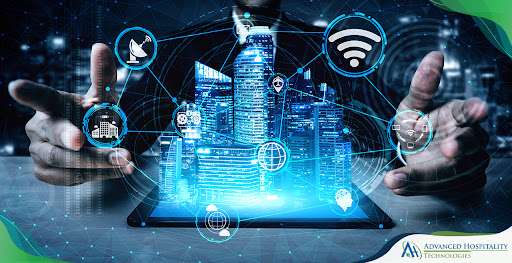The Future of Hospitality: Emerging Technologies.

The hospitality industry is on the cusp of a thrilling transformation, propelled by rapid advancements in artificial intelligence (AI), robotics, and the Internet of Things (IoT). These innovations are not just reshaping the operations of hotels and restaurants, but also revolutionizing how they interact with their guests. The potential of these technologies to enhance operational efficiency and elevate the customer experience to unprecedented levels is truly exciting. This article delves into the impact of these emerging technologies on the hospitality sector, painting a picture of a future that is both innovative and promising.
AI-Powered Personalization:
AI is at the forefront of personalizing the guest experience in hotels and restaurants. AI systems can tailor services to individual preferences through data analysis and machine learning, enhancing customer satisfaction and loyalty. For example, AI can analyze a guest’s previous bookings, dining preferences, and even online reviews to offer customized room settings, meal suggestions, and activities.
Hotels leverage AI-driven chatbots and virtual assistants to provide 24/7 customer service, answer queries, and manage reservations without human intervention. These AI interfaces are improving efficiency and ensuring that the guests receive instant responses, thereby enhancing their overall experience.
Robotics in Service Delivery:
Robotics technology is another area where hotels and restaurants are seeing significant benefits. Robots are being deployed for various tasks, including room service delivery, cleaning, and even cooking. In some high-tech hotels, robot butlers are a reality, capable of delivering towels, toiletries, and even room service orders directly to guest rooms.
Restaurants, too, are experimenting with robotics. Robotic chefs and servers are being used to prepare and serve food. These robots can consistently produce high-quality dishes and reduce waiting times, all while adding a novelty factor that attracts guests.
IoT for Enhanced Operational Efficiency:
The IoT enables hotels and restaurants to achieve higher operational efficiency through interconnected devices. Smart thermostats, lighting systems, and security cameras can all be controlled remotely, reducing energy costs and enhancing security. Furthermore, IoT devices can monitor equipment performance and predict maintenance needs, preventing downtime and ensuring that the guest experience remains uninterrupted.
For instance, smart refrigerators in restaurants can track inventory levels and automatically reorder supplies when stocks are low. Similarly, IoT-enabled kitchen appliances can adjust cooking times and temperatures based on the type of food, ensuring perfect results every time.
Transforming Guest Experiences:
Beyond operational efficiency, these technologies are profoundly transforming guest experiences. AI and IoT enable a seamless, personalized guest journey from the moment of booking to post-stay feedback. Thanks to IoT integration, guests can control room temperature, lighting, and window shades through smartphones or voice commands.
Virtual reality (VR) and augmented reality (AR) technologies are also innovatively enhancing the guest experience. Hotels use VR to allow potential customers to tour their facilities virtually before booking. Meanwhile, AR can enrich the visitor experience by providing digital overlays that offer historical facts or directional information about the hotel and its surroundings.
Challenges and Considerations:
While the benefits are substantial, integrating AI, robotics, and IoT in hospitality also comes with challenges. Privacy concerns are paramount, as these technologies often rely on collecting and analyzing personal data. Hotels and restaurants must ensure that they have robust cybersecurity measures to protect guest information.
Moreover, there is the human aspect to consider. As robots and AI systems take over more tasks, there is a potential impact on employment in the hospitality sector. Establishments must navigate these changes thoughtfully, ensuring that technology complements human service, not replaces it.
Sustainability through Technology:
One of the critical challenges facing the hospitality industry today is sustainability. Integrating AI, IoT, and robotics offers significant opportunities to address this. Smart buildings equipped with IoT sensors can significantly reduce energy consumption and waste. For instance, IoT systems can manage energy use more efficiently by adjusting lighting, heating, and air conditioning based on occupancy or time of day. Additionally, AI can optimize resource allocation, predicting peak times and adjusting operations accordingly to minimize waste.
Robots and AI systems also contribute to sustainability by improving resource management in kitchens and reducing food waste, one of the significant issues in the restaurant industry. Automated systems can track inventory accurately, predict demand more reliably, and thus help order precisely what is needed.
Enhancing Safety and Security:
In the post-pandemic world, health and safety have become paramount. Robotics and AI can play vital roles here by minimizing human contact in various operations, thus reducing the risk of contagion. For example, robots can handle tasks such as cleaning and sanitizing rooms and public areas in hotels, ensuring a high standard of hygiene without human error.
AI-powered surveillance systems equipped with facial recognition and abnormal behavior detection can enhance security in hotels and restaurants. These systems can instantly analyze and respond to security threats, providing a safer environment for guests and staff.
Deepening Customer Engagement:
Technologies like AI and IoT are about efficiency and sustainability and open new avenues for deepening customer engagement. AI-driven analytics can help hotels and restaurants understand their customers better, anticipating needs and preferences to tailor marketing strategies effectively. For instance, based on a guest’s previous interactions, AI can suggest personalized package deals or special offers that are more likely to convert.
Furthermore, IoT connectivity allows businesses to continuously stay in touch with their customers through apps and wearables. Guests could receive real-time notifications on their devices about special events, dining options, or even exclusive offers based on their location within the hotel.
The Human Touch in the Digital Age:
Amidst the influx of technology, the human touch remains the heart of hospitality. Therefore, the integration of these technologies must be approached with sensitivity, ensuring that they enhance and complement the human aspects of service. The importance of training staff to work alongside robots, understanding AI systems, and maintaining high-quality interpersonal interactions cannot be overstated. This transition is a reassurance that technology is not replacing humans, but rather, enhancing their capabilities and the overall guest experience.
Conclusion:
As we look to the future, the role of AI, robotics, and IoT in hospitality is only set to increase. These technologies will become more sophisticated, AI will become more predictive and personal, robotics will be more adaptable and gentle, and IoT will be more comprehensive and integrated.
Hotels and restaurants that can harness these technologies while focusing on customer satisfaction and sustainable practices will lead the industry. It is not just about adopting new technologies but about integrating them to enhance the essence of hospitality—personalized, considerate, and memorable experiences.
The future of hospitality is a harmonious blend of technology and tradition. Digital innovations enhance human service, making every guest’s stay comfortable and exceptional. As we navigate this technological evolution, the most successful businesses will be those that can balance efficiency with empathy, innovation with tradition, and automation with personalization.







